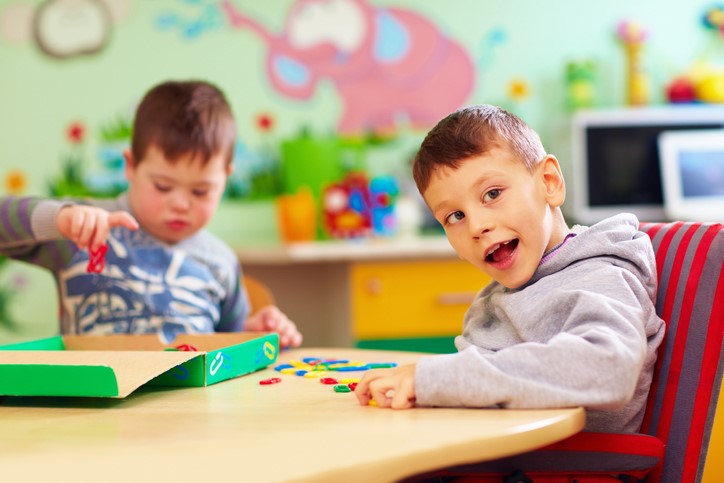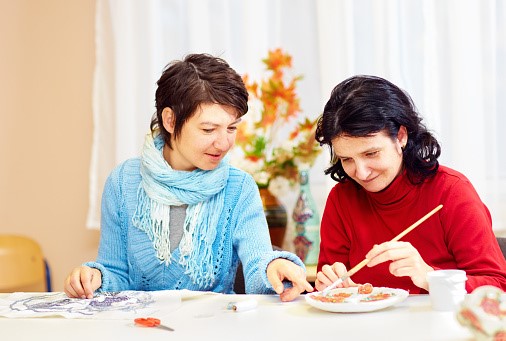Rehab Group offer a wide range of services to support people with autism. These services include day and residential services, outreach services, training and education, respite and bespoke services. As part of our strategic vision and our commitment to the people who use our services, we have developed a strategic plan to enhance the many successful elements of our current specialist service provision. We aim to integrate our autism services and to develop our services further in line with international best practice. We aim to work towards offering a seamless pathway of specialist support for people with autism- through which people can continuously progress and reach their full potential.

We want all service development informed by those who use or will use our services. In 2018, we held focus groups nationwide to ask people with autism who use Rehab Group services about what is important to them regarding the services they receive. In addition, we spent time meeting with families and staff members, and we would like this engagement to continue on an ongoing basis locally and nationally. We also conducted a staff survey and carried out a baseline analysis of the number of people in our services, the services we currently provide, and where these services are provided. We plan to continue this engagement at a local, regional and national level on an ongoing basis.
We looked at international best practices – both from the perspective of policy and service delivery guidelines so that these guidelines will help inform our approach and practice. We also identified potential partner organisations that we can work alongside.
This strategic plan will inform our organisational approach to the delivery of autism services, and we will continue to update the document in line with evolving research and developments internationally. For example, current demographic research would lead us to expect the number of people with autism accessing our services to grow substantially over the coming years. This plan will strengthen our ability to provide high-quality specialist support.

There are several critical elements contained in this strategy that will underpin all of our autism services:
The underlying principles of the strategy will inform and underpin all elements of service delivery. These principles are – valuing people’s individuality, co-production, personal progression, positive behaviour support, societal advocacy, and evidence-based practice.
Personal progression
We will utilise outcome measurements such as the WHOQOL and domain-specific outcome measures. In addition, programmes/interventions will be based on identified domains.
Individual progression and competency building will be central to our service delivery, with programmes directed towards employment, independence in activities of daily living, increasing each individual’s quality of life and building natural support networks. Planning tools such as the autism star will guide individual action plans.
Transitioning through key life stages, transitioning between services, and from home to service will be an integral area of focus for planning and service delivery.
Early intervention, family support and education/support in schools will also support transition and planning processes.
Our people
All staff are undertaking a foundation training course via E-NLN that will give them a broad understanding of autism and how they may best support a person with autism to achieve their potential.
This foundation training will be further built on a modular basis to incorporate more specific learning and skills development for staff supporting people with autism regularly or in autism-specific services. This will include areas such as supporting people with challenging behaviours, communication difficulties, co-existing mental health difficulties and physical and sensory difficulties.
For new services, job descriptions and recruitment processes will be designed to ensure that all support staff working in autism-specific services have appropriate experience, education and competencies to enable them to understand and support people with autism. Volunteers will also form part of service delivery in mentoring roles to provide modelling/training, social support and connection.
Evidence-based practice
All programmes and interventions/approaches will be evidence-based and regularly reviewed to ensure we continually work to international best practice guidelines as an organisation. In addition, a resource library (online) will be available to all staff.
Multi-disciplinary inputs will support service delivery and offer assessment and therapeutic intervention as required, including Psychology, Behavioural Therapy and Rehabilitation/learning support through rehabilitation officers.
Environment
NICE guidelines regarding the physical environment will inform premises development. All centres will have an action plan to continually assess and improve our surroundings where we support people with autism.
Innovation, Research and Technology
New and innovative technology will augment all service delivery. It will incorporate virtual reality, applications that will support individual goals (e.g. communication/social skills), and technology to support anxiety and transition.
The research will form an essential part of our service delivery, and the rehab group have developed relationships with UCD’s Autism research department and ICAN (Autism and Neurodevelopmental research) in NUIG and DCU.
Innovation concerning service delivery models will be based on international best practices.
Quality Standards
Rehab will work towards accreditation with the National Autistic Society in the UK to ensure that our services follow international best practices.
Societal Advocacy
We will also work towards social inclusion and understanding concerning autism and will use our strength and connections to champion people’s rights. Rehab Group recently acquired a Cork-based autism service called Aspect; read all about it here